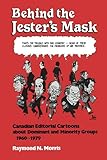Behind the Jester's Mask : Canadian Editorial Cartoons About Dominant and Minority Groups 1960-1979 / Raymond Morris.
Material type: TextSeries: HeritagePublisher: Toronto : University of Toronto Press, [1989]Copyright date: ©1989Description: 1 online resource (240 p.)Content type:
TextSeries: HeritagePublisher: Toronto : University of Toronto Press, [1989]Copyright date: ©1989Description: 1 online resource (240 p.)Content type: - 9781487579203
- 9781487578534
- 971.064/0207 23
- online - DeGruyter
| Item type | Current library | Call number | URL | Status | Notes | Barcode | |
|---|---|---|---|---|---|---|---|
 eBook
eBook
|
Biblioteca "Angelicum" Pont. Univ. S.Tommaso d'Aquino Nuvola online | online - DeGruyter (Browse shelf(Opens below)) | Online access | Not for loan (Accesso limitato) | Accesso per gli utenti autorizzati / Access for authorized users | (dgr)9781487578534 |
restricted access online access with authorization star
http://purl.org/coar/access_right/c_16ec
The editorial cartoon, a daily diversion for millions of Canadians, strikes most of its readers as irreverent, outspoken, iconoclastic. The reality, as Raymond Morris demonstrates, is more complex. Morris examines the form and content of Canadian editorial cartoons of the 1960s and 1970s that concerned relations between French and English Canadians and between Canada and the United States.He argues that since the advent of the monopoly press and the professional, politically neutral artist, cartooning has subtly changed from low satire of the paper's political opponents to medium satire directed against the current government. Cartoons generally portray politics as a hive of squabbling, waste, and folly; business, while portrayed much less often, is shown as a hive of rational, beneficial productivity. Cartooning is thus often based on an imaginary opposition, a double standard which sells the virtues of corporate decision-making at the expense of democracy as seen in the capitalist state. Cartoons generally depict scenes in which the social order valued by the cartoonist's own group (say English Canadians) is being threatened by either a dominant (American) or a minority (Quebecois) group. The threatened group is usually unable to maintain the old order, and is accordingly depicted as fools or victims.
Mode of access: Internet via World Wide Web.
In English.
Description based on online resource; title from PDF title page (publisher's Web site, viewed 01. Nov 2023)


